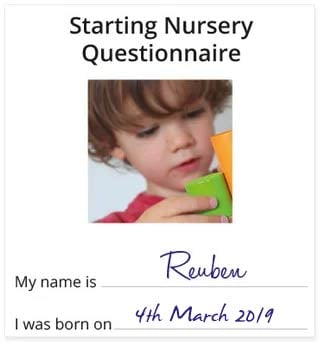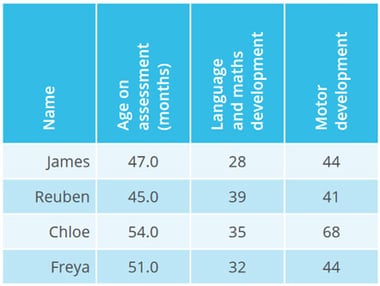Case Studies / Best Start in Early Years
Reuben
Using ASPECTS for the very best start in the early years
Find out more.
ASPECTS: Supporting Early Learning
We all know how important the early years are. The right nursery environment helps children and parents lay crucial cornerstones for wellbeing, development and future academic success.
Reuben’s Story
Reuben entered Daysprings Nursery at 3 years, 9 months of age. The nursery is part of an all-through school, and was rated “Outstanding” in a recent Ofsted inspection. Staff at Daysprings pride themselves on the inclusive and holistic nature of their provision for the very youngest children, with particular attention paid to the personal, social and emotional needs of each child.
A week after Reuben started at Daysprings, his mother raised some concerns about how he was adjusting to the new environment. Staff noticed that he was attentive during story time and had formed a close bond to another child, but that he was reticent in larger groups and hesitated to join in activities with the older children.

Why ASPECTS?
At Daysprings, ASPECTS is used to assess each child at the start and end of their time at nursery. Supporting the observations of teachers and classroom assistants, the assessment is a valuable tool for identifying the needs of each individual child, relative to his or her stage of development. As Reuben’s teacher notes, “It gives us the information we need in order to give every child the very best start.”
The assessment provides teachers with the opportunity to sit down with a child, one-to-one, for up to twenty minutes – time that can prove invaluable for children like Reuben, who may initially feel intimidated by the larger classroom environment.
What can ASPECTS measure?
ASPECTS measures early literacy and numeracy using a computer based, story book approach.
Reuben was shown a series of pictures like the ones above, and asked to identify different shapes, letters and sounds.
The assessment is adaptive, so the more questions Reuben got right, the more pictures he was shown, each slightly more challenging than the one before.
Once he had finished this part of the assessment, the teacher carried out a number of further activities with Reuben to measure his motor development skills.
Finally, Reuben’s teacher answered a number of questions about his personal, social and emotional development, based on her own classroom observations and the “starting pre-school” questionnaire, which Reuben and his mother completed together.

PSED: Personal, Social and Emotional Development
The PSED module of ASPECTS asks a series of questions about a child’s communication skills, levels of confidence and independence and ability to form relationships with both adults and peers.
Given that the level of uncertainty when assessing young children is quite high, this provides vital background information about a child which can be used to inform strategies for learning and growth.

Reports and Results
Once Reuben’s teacher had assessed all her new starters in the nursery, she printed out a table of scores report and a scatter graph, which showed her how Reuben’s scores compared to those of children of a similar age.
She was able to reassure Reuben’s mother that his overall development was progressing at the expected rate, and that in some areas, Reuben was really quite advanced for his age: his language skills in particular were on par with those of some of the oldest children in the nursery.
Next Steps
- Near the end of their time at Daysprings, the children in Reuben’s class were assessed again using the ASPECTS assessment.
- The feedback from the assessment showed demonstrable improvement in core areas of learning across the cohort, over and above what might typically be expected of children of this age – real evidence of the difference an excellent nursery can make.
- Reuben’s individual report indicated that while he too had made significant progress, his language and maths development was somewhat lower than expected.
- A closer inspection of the new table of scores revealed that Reuben’s literacy was still very advanced, but his numeracy skills were struggling to keep pace.
- Daysprings will share this data with Reuben’s new reception teacher, who will use the information to decide whether additional support in this area may be helpful as he commences the next stage of his school career.

Want to know how Cambridge Insight data can help in your school?
Find out more about our assessments

